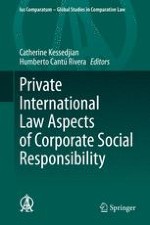2020 | OriginalPaper | Buchkapitel
Canada
verfasst von : Joost Blom
Erschienen in: Private International Law Aspects of Corporate Social Responsibility
Verlag: Springer International Publishing
Aktivieren Sie unsere intelligente Suche, um passende Fachinhalte oder Patente zu finden.
Wählen Sie Textabschnitte aus um mit Künstlicher Intelligenz passenden Patente zu finden. powered by
Markieren Sie Textabschnitte, um KI-gestützt weitere passende Inhalte zu finden. powered by
